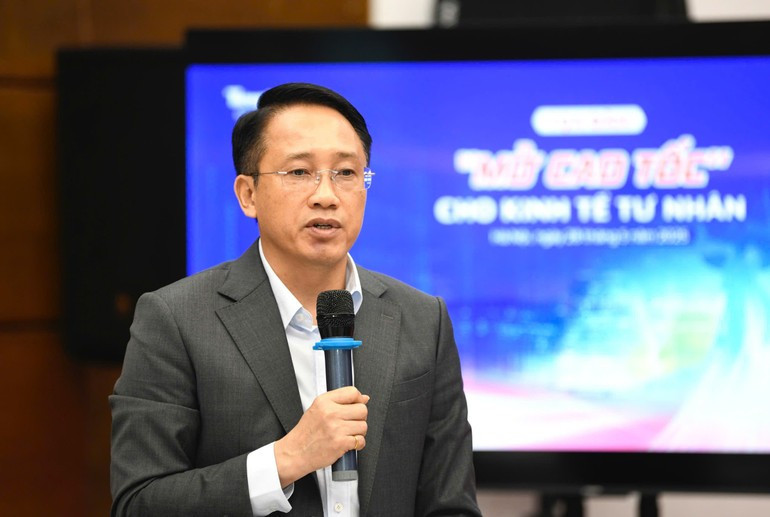Abolishing lump-sum tax to create a fair competitive environment for all economic sectors
The transition from lump-sum taxation to a self-declaration system marks a significant turning point in tax administration and in promoting the development of the private sector. Our reporter interviewed Mai Son, Deputy Director of the Tax Department, on this matter.

Q: The government’s recently issued Decree 70 stipulates the implementation of e-invoices generated from cash registers for business households. What measures has the Tax Department taken to effectively implement this policy?
A: According to Decree 70, from June 1, 2025, all business households and individuals with an annual revenue of 1 billion VND (38,300 USD) or more will be required to use e-invoices generated from cash registers, which transmit electronic data to the tax authority. To implement this, the Tax Department has adopted various comprehensive measures to support business households and individuals, specifically:
First, we have worked with e-invoice software providers to offer free software and reduce the cost of issuing e-invoices for businesses, especially household and individual enterprises.
Second, we have instructed tax offices to actively coordinate with relevant government agencies to review and identify businesses subject to this requirement. The tax authorities have also collaborated with e-invoice providers and tax agents to organise training conferences on legal policies, and formed working groups to visit each business household to raise awareness, encourage compliance, and provide guidance on registering and using e-invoices generated from cash registers.

Third, we are focusing on modernising the tax sector by implementing digital platforms, including the eTax Mobile app, to support taxpayers. In the near future, the tax authorities will continue to upgrade electronic tax services to better assist with tax declaration and payment, particularly for business households and individuals.
Additionally, in a spirit of openness and a commitment to serving taxpayers, the Tax Department will soon organise an online conference inviting business households and individuals to discuss and share their concerns and difficulties. This will enable the tax authorities and businesses to jointly implement the e-invoice policy in accordance with the law.
Q: What is the significance of the shift from lump-sum taxation to a self-declaration system for tax administration in particular and the development of private enterprises in general?
A: This shift is a critical step for improving tax administration and promoting the growth of the private sector.
In terms of tax management, eliminating lump-sum taxation is essential to enhance transparency and fairness. When business households self-declare and pay tax based on actual revenue, tax obligations more accurately reflect their capacity and business performance. This aligns with modern tax administration principles of “self-declaration, self-payment, and self-responsibility,” helping to create a transparent and equitable business environment across all economic sectors.
Furthermore, moving to a declaration-based system contributes to modernisation and improves tax management efficiency. When business households declare taxes via digital platforms, tax authorities can provide more convenient support services, enhance fraud prevention, and reduce revenue loss. This approach allows for more accurate data management, supervision, and support. Tax administration becomes data-driven, digitalised, and transparent—laying the foundation for a modern, efficient tax system aligned with sustainable development and deeper integration goals.
Additionally, abolishing lump-sum taxation paves the way for the development and transformation of the private sector. It offers tangible benefits to business households in terms of growth opportunities, access to state support policies, and a fairer business environment. Transparency in accounting and invoicing improves financial credibility, making it easier to access capital and support policies, and to develop into enterprises. During the transition, households will also be supported in engaging with the digital economy via shared accounting software and electronic platforms, enhancing business management and modernisation.
The self-declaration method also ensures all business entities are managed fairly, with tax obligations proportionate to their size and income. This accurately reflects each household’s business capacity and fosters a healthier, more equitable competitive environment.

Q: Business households make up a significant portion of the economy and serve as a foundation for enterprise development in Viet Nam. However, they face challenges in governance, capital, and market access. What support measures does the tax authority have to ensure effective tax management during this pivotal transition?
A: To provide maximum support during this transition, the tax sector is undertaking the following key tasks:
We are reviewing and proposing amendments to tax laws and regulations. The draft of the new Law on Tax Administration proposes ending the lump-sum tax mechanism for business households and individuals and shifting to self-declaration and payment. Additionally, we are reviewing personal income tax law and VAT regulations to revise the revenue threshold for tax exemption, aiming to reduce the tax burden for low-revenue business households.
We are simplifying bookkeeping, invoicing, and documentation procedures to make them more accessible. We are also working with providers to offer free shared accounting tools and e-invoicing software, including support with equipment and service costs during the initial phase. Guidance and support on accounting, tax, and legal matters are being enhanced to help business households become familiar with transparent record-keeping and invoicing without imposing additional complexity or compliance costs.
We continue to promote administrative reforms in tax procedures, simplifying processes and building automated systems to determine tax obligations based on e-invoice data. These systems will auto-calculate tax and pre-fill tax declarations, requiring only taxpayer verification. We are also collaborating with relevant ministries and agencies to integrate data and streamline the processes for business and tax registration.
We are dedicating resources to fully support business households before and after the transition. Both in-person and online advisory programmes are being rolled out to help them understand accounting regimes, invoicing, and tax obligations. After the transition, tax offices will maintain regular support channels to assist new enterprises during their early operations.
With such support, the Tax Department is confident that business households will be more assured as they transition, ensuring compliance with new regulations while continuing to grow.

Q: What preparations are being made for the abolition of lump-sum tax?
A: Alongside the perfection of the legal framework on tax policies and administration, and proposals to amend relevant tax laws, the tax authority is implementing a new tax management model. A key priority is streamlining the organisational structure for efficiency and effectiveness, especially in managing business households.
We are accelerating administrative reforms to simplify tax declaration and payment procedures for households and individuals. We are also building application systems that can automatically determine tax obligations based on e-invoice data used by business households.
In terms of support during the transition, recognising the initial difficulties business households may face as of January 1, 2026, we have implemented specific support measures.
The tax sector is also intensifying internal digital transformation to improve public service quality and tax management capacity. We are enhancing data connectivity and integration with relevant ministries and agencies (as stipulated by the Law on Tax Administration and Government Scheme 06 on population data and digital identification). This data integration enables the tax authority to closely monitor business household activities post-lump-sum tax, and promptly detect risks or legal violations.
Thank you very much!








